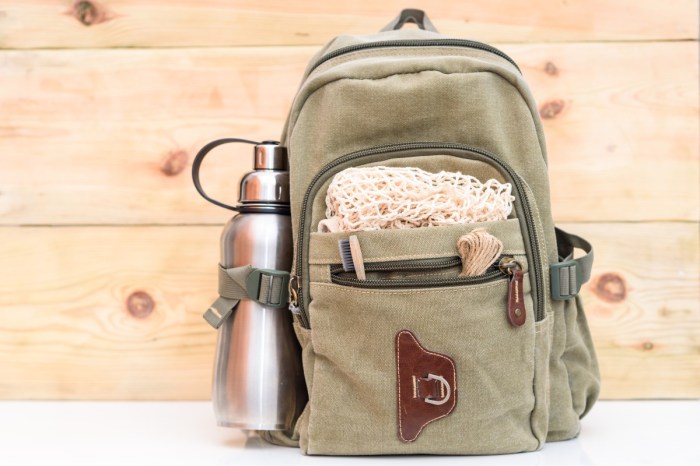
Zero waste travel advice isn’t just about reducing your environmental footprint; it’s about enriching your travel experience. By consciously choosing sustainable options, you’ll discover a deeper connection with the places you visit and contribute to the preservation of our planet. This guide explores practical strategies for minimizing waste throughout your journey, from pre-trip planning to on-the-ground choices, transforming your travels into responsible and rewarding adventures.
We’ll delve into eco-friendly accommodations, sustainable transportation, and mindful consumption, empowering you to explore the world with a lighter environmental impact.
Sustainable Accommodation Choices

Choosing sustainable accommodation is a crucial step in minimizing your environmental footprint while traveling. By opting for eco-conscious lodging, you directly support businesses committed to preserving natural resources and reducing their impact on the planet. This section will explore the differences between various accommodation types and highlight the key features of eco-friendly options.Eco-lodges and traditional hotels represent distinct approaches to hospitality and environmental responsibility.
While both offer lodging, their commitment to sustainability varies significantly.
Eco-lodges versus Traditional Hotels: A Comparison of Environmental Impact
Eco-lodges prioritize minimal environmental impact through design, construction, and operation. They often utilize locally sourced, sustainable materials, implement energy-efficient technologies, and focus on reducing waste. In contrast, traditional hotels, while some may incorporate sustainable practices, generally prioritize profit and guest comfort above stringent environmental considerations. This often translates to higher energy and water consumption, increased waste generation, and a greater reliance on non-renewable resources.
The overall carbon footprint of an eco-lodge is considerably smaller than that of a comparable traditional hotel.
Defining Features of an Eco-Friendly Hotel
Several key features distinguish an eco-friendly hotel from its less sustainable counterparts. These hotels often implement energy-saving measures such as LED lighting, smart thermostats, and solar panels. Water conservation is another critical aspect, achieved through low-flow showerheads, water-efficient toilets, and rainwater harvesting systems. Waste reduction strategies include recycling programs, composting initiatives, and the use of biodegradable toiletries. Furthermore, eco-friendly hotels often source food locally, reducing transportation emissions and supporting local farmers.
Finally, many prioritize the use of sustainable building materials and environmentally friendly cleaning products.
Examples of Eco-lodges near National Parks
Numerous eco-lodges are strategically located near National Parks, offering travelers a sustainable and immersive experience. For example, near Yosemite National Park in California, several lodges prioritize minimizing their environmental impact through renewable energy sources and waste reduction programs. Similarly, in Costa Rica, numerous eco-lodges nestled within or near rainforests emphasize sustainable tourism practices, often incorporating educational programs about local ecosystems and wildlife conservation.
These lodges often partner with local communities, creating economic opportunities and fostering a sense of shared responsibility for environmental protection. These examples showcase how eco-lodges can contribute to both conservation efforts and local economies.
Sustainability Practices Comparison Table
| Accommodation Type | Energy Efficiency | Water Conservation | Waste Management |
|---|---|---|---|
| Eco-lodge | High (solar, geothermal, energy-efficient appliances) | High (low-flow fixtures, rainwater harvesting) | High (recycling, composting, biodegradable products) |
| Traditional Hotel (Luxury) | Moderate (some energy-efficient features, but often high overall consumption) | Moderate (some water-saving features, but often high overall consumption) | Moderate (recycling programs, but often high waste generation) |
| Traditional Hotel (Budget) | Low (minimal energy-efficient features, high overall consumption) | Low (minimal water-saving features, high overall consumption) | Low (limited or no recycling programs, high waste generation) |
| Airbnb (Private Home) | Variable (depends on host’s practices) | Variable (depends on host’s practices) | Variable (depends on host’s practices) |
Reducing Waste During Activities: Zero Waste Travel Advice
Minimizing your environmental impact while enjoying outdoor adventures is achievable with a little planning and mindful choices. By adopting a zero-waste approach, you can contribute to preserving the natural beauty of these spaces for future generations. This involves careful consideration of your waste generation throughout your activities, from packing your bag to leaving no trace behind.
Minimizing Waste During Hiking and Camping
Careful planning is key to reducing waste during hiking and camping trips. Packing reusable alternatives for single-use items significantly decreases your environmental footprint. Before you head out, prepare meals that minimize packaging. Consider using reusable food containers, water bottles, and cutlery. Properly disposing of waste is crucial; pack out everything you pack in, and utilize designated waste disposal facilities wherever available.
If these are unavailable, practice Leave No Trace principles, packing out all trash, including biodegradable items like food scraps.
Responsible Wildlife Viewing Practices, Zero waste travel advice
Respecting wildlife and their habitats is paramount. Avoid feeding animals, as this disrupts their natural foraging behaviors and can lead to dependence on humans. Maintain a safe distance to avoid stressing or disturbing animals, and never approach or attempt to interact with them. Using binoculars or a telephoto lens allows for responsible observation without intruding on their space.
Remember, your presence should have minimal impact on their natural behavior.
Avoiding Single-Use Plastics During Water Activities
Water activities, such as swimming, kayaking, or paddleboarding, often involve a high consumption of single-use plastics. To minimize this, bring your own reusable water bottle, and avoid purchasing bottled water or sugary drinks in plastic containers. Reusable dry bags are a great alternative to plastic zip-lock bags for storing clothing or electronics. If renting equipment, inquire about sustainable options and practices employed by the rental company.
Always be mindful of not leaving any trash behind, especially in and around water bodies.
Reusable Alternatives for Common Travel Items
Choosing reusable alternatives significantly reduces waste generated during travel. Prior planning and packing are crucial.
- Reusable water bottle instead of plastic bottles.
- Reusable coffee cup instead of disposable cups.
- Reusable food containers instead of plastic wrap or bags.
- Reusable shopping bag instead of plastic bags.
- Bamboo cutlery set instead of plastic cutlery.
- Silicone food covers instead of plastic wrap.
- Reusable snack bags instead of plastic zip-lock bags.
- Solid shampoo bar and conditioner bar instead of plastic bottled products.
- Travel-sized, refillable containers for toiletries instead of single-use travel-sized products.
Zero Waste Food and Drink

Embarking on a zero-waste journey while traveling requires mindful planning and preparation, especially concerning food and drink. By making conscious choices and utilizing reusable items, you can significantly reduce your environmental impact and enjoy delicious, sustainable meals along the way. This section provides practical strategies for minimizing food waste and embracing eco-friendly food and drink options during your travels.Packing Reusable Containers and Cutlery for Meals involves selecting durable and lightweight options.
A set of reusable containers, ideally nested for efficient packing, is essential for storing leftovers, packing snacks, and purchasing food from local markets. Opt for containers made from materials like stainless steel or BPA-free plastic. Similarly, a reusable cutlery set, including a fork, knife, spoon, and chopsticks, will eliminate the need for single-use plastic utensils. Consider a compact, silicone food-safe collapsible cup or a reusable water bottle to further reduce your waste footprint.
Sustainable Food Choices for Travelers
Sustainable food choices while traveling are readily available with a little planning. Prioritizing locally sourced, seasonal produce minimizes transportation emissions and supports local farmers. Farmers’ markets often offer fresh, high-quality ingredients, allowing you to reduce reliance on pre-packaged supermarket items. Choosing plant-based meals whenever possible also significantly reduces your environmental impact. For example, a lentil salad made with locally sourced vegetables is a far more sustainable option than a beef burger from a fast-food chain.
Many restaurants now offer vegetarian and vegan options, making it easy to incorporate plant-based meals into your travel itinerary.
Minimizing Food Waste While Traveling
Minimizing food waste while traveling involves careful planning and portion control. Before heading out for the day, pack only the food and snacks you are likely to consume. Avoid over-purchasing, especially perishable items. If you find yourself with leftover food, creatively repurpose it. Leftover vegetables can be added to an omelet or stir-fry the next day.
If you are staying in accommodation with a refrigerator, store perishable items appropriately. Proper food storage extends the shelf life of your groceries and reduces the likelihood of waste. Composting food scraps, where facilities are available, is another effective method for managing food waste.
Finding Local and Sustainable Food Sources During Travel
Discovering local and sustainable food sources enhances your travel experience and minimizes your environmental impact. Farmers’ markets are excellent starting points, offering a wide array of fresh, seasonal produce directly from local farmers. Community-supported agriculture (CSA) programs, if available in your destination, provide a regular supply of fresh, locally grown food. Many restaurants are increasingly committed to sourcing ingredients locally and sustainably.
Look for restaurants that highlight local suppliers or feature seasonal menus. Mobile apps and online resources can also help you identify local food markets, farms, and restaurants committed to sustainable practices. For instance, many apps provide reviews and ratings based on sustainability criteria.
Embarking on a zero-waste journey isn’t about perfection; it’s about progress. Every small step you take, from refusing single-use plastics to choosing sustainable transportation, contributes to a larger movement towards responsible travel. By adopting these practices, you’ll not only minimize your environmental impact but also enrich your travel experience, fostering a deeper appreciation for the destinations you explore and the communities you encounter.
Remember, sustainable travel is a journey, and each conscious choice brings you closer to a more responsible and rewarding adventure.
FAQ Guide
How can I reduce waste on flights?
Bring a reusable water bottle (fill it after security), decline in-flight amenities you don’t need, and pack snacks in reusable containers.
What are some zero-waste alternatives for toiletries?
Use solid shampoo bars, conditioner bars, and reusable containers for lotions and other liquids. Consider travel-sized refillable containers.
How can I find sustainable food options while traveling?
Seek out local farmers’ markets, support restaurants committed to sustainable sourcing, and pack reusable containers for leftovers.
What if I can’t find eco-friendly accommodations?
Prioritize accommodations with clear sustainability initiatives (e.g., recycling programs, water conservation efforts), and contact the hotel directly to inquire about their environmental practices.

